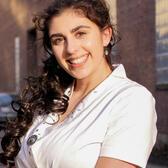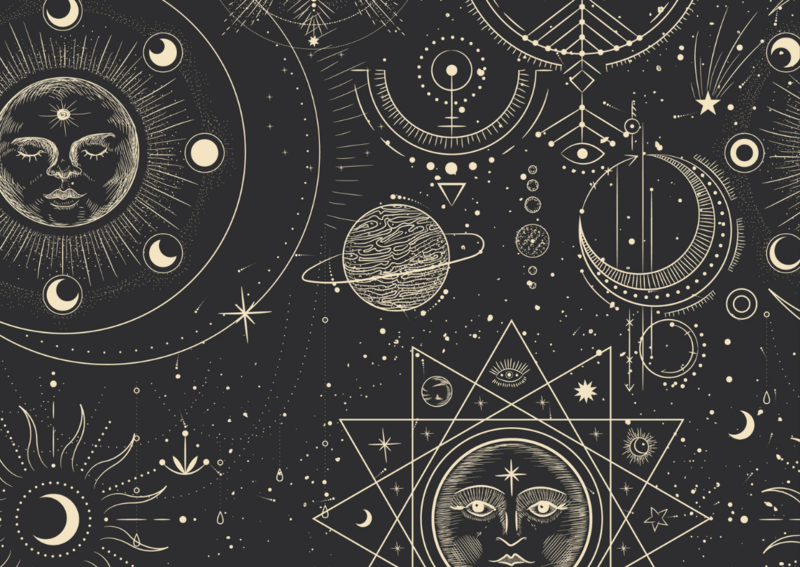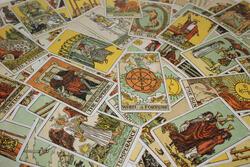Astrology Is More Jewish Than You Think
In case you’re wondering, Miriam the Prophetess was probably an Aquarius. An assertive water bearer, bringing water forth from the well? Sounds about right.
But the emphasis is on probably. There is no definitive truth to this statement: Miriam’s enslaved family most likely didn’t record her time of birth, the way humanity measures and discusses time has changed, and, of course, the written Torah was not codified until much, much later. Besides, astrology is not an exact science.
But I was never very interested in the sciences, and it was the fluid nature of astrology that drew me in, further than it ever had, in 2020. Last March, in the span of a few days, my thoughts went from “What time should I leave for work if I want to stop for coffee and pick up one thing from Target?” to “Should I stock up on face masks?” Like many people, I was overwhelmed by the influx of breaking news about a global catastrophe and found myself obsessed with the latest research, even if I only comprehended a portion of it. (As someone who nearly flunked high school biology and has a degree in Television, I never expected to regularly pore over scientific articles about mRNA, but there I was.)
As the pandemic dragged on, I found myself exhausted by the influx of problems that needed clear-cut solutions. I realized that I couldn’t always be searching for answers, I just needed a break from the din of pandemic-related thoughts. And so I found respite in the constant pinging of astrology memes, mostly from Instagram, back and forth between me and my friends. “Here’s one about how all Sagittarians are having to cancel their wild vacation plans.” “Omg, lol, that’s so you.”
It was so me. I have vouchers for four different airlines from my canceled plans for 2020.
Astrological memes and horoscopes are specific enough that I felt some sort of community with people who share my sign, but they’re vague enough that if I came across one that didn’t feel as “me,” I could shrug, roll my eyes, and and assure myself that I didn’t really believe in astrology anyway. But life was harder than ever. I was isolated, and inane memes about how Gemini moons are talkative were a welcome distraction from the pandemic. And without trying to, it started to feel like I was finding answers to my introspective concerns through astrology. Suddenly, I was falling down the rabbit hole. I bought an astrology book. I downloaded three different apps. I would respond to friends and family with lines like “That’s not very Scorpio of you.”
And then came my nagging inner voice of guilt. Shouldn’t I be using this time to be more Jewish? Shouldn’t I try to organize Zoom Shabbat dinners? Shouldn’t I sign up for some kind of Jewish education course? Shouldn’t I be trying to be more spiritual in a Jewish way?
“No,” is a short and simple answer to these questions; during this bizarre, stressful time, we’re all entitled to find joy where we can. In the past, my Jewish joy had come from community gatherings and structured learning, both of which were more inaccessible to me under the weight of lockdown. I craved spirituality, but struggled to find it without the Jewish spaces I once relied on. It only makes sense that I filled this void with something else—and, it turns out, astrology isn’t incompatible with Judaism like I thought. According to Cam Aethera, a Jewish astrologer: “Historically, there are no hard lines between astrology and religion,” she says. “Astrology is Judaism; they are completely intertwined.” In regards to being Jewish and practicing astrology? Cam says, “I never feel guilty about it.” To be Jewish and to find spiritual guidance in astrology are not mutually exclusive.
It was radically reassuring to hear that guilt should not be a part of my journey in astrology. “Should” questions tend to instigate a lot of anxiety, because they keep me from accepting my reality and trusting my actions. When I think “I should be more Jewish,” the implication is that I’m somehow falling short or not “doing Judaism right.”
In the midst of my astrology crisis, I took a breath and asked myself what, outside of a boisterous community, I appreciated about being Jewish. And I realized that my favorite part of Judaism is its complexity, the open and evolving nature of tradition and culture. For example, the Hanukkah history I most vividly remember learning about as a child is the feud between Hillel and Shammai regarding the lighting of the candles. There was no “right way” to perform the ritual, just different ways. I am appreciative that my Jewish education was rooted in the beauty of argument and critical thought processes. My new interest in astrology is not a blockade to that, but rather an opportunity to think analytically about the messaging surrounding it that made me feel guilty in the first place.
Cam and I discussed how institutionalized religion resulted in stricter boundaries between religious observance and more pagan spiritual practices, and how astrology, though entwined with the roots of both religion and science, was eventually rejected by both. Hellenistic religions and the practice of astrology were rooted similarly in the cosmos. And those roots are still visible. For example, Lilith is an anti-patriarchal figure in both Judaism and astrology, though she is honored differently in the two traditions. Cam can interpret the story of Moses, Aaron, and the golden calf through the lens of the shift from the age of Taurus to the age of Aries, and theorize the signs of major figures with expertise. A knowledge of history is the base of her practice, with the understanding that the clash between Church propaganda and divination practices resulted in false narratives about the nature and purpose of astrology. This can be countered by “challenging the old narrative, and taking it to the next level by thinking about things from an astrological perspective.”
The history of modern practices of astrology, and countering narratives, is not only a spiritual one, but also a feminist one. Cam explains that in the 1960s and 1970s, during second-wave feminism, women were “revisiting all religions—what was going on with women during these times?” Well, they wanted to return to stories that have been passed down to us as male-centered and look at them more deeply. The feminist movement initiated “the idea that there multiple perspectives,” a nuance absent from the age when hard borders were drawn between religion, science, and astrology. Revisiting, reinterpreting, and revising history with a critical lens has opened the door to viewpoints formerly suppressed or sidelined.
When it comes to practicing both Judaism and astrology, Cam makes one thing clear to me: Astrology is not her faith, it is her craft. It does not mirror her faith in a God. And so, as we think critically about how astrology interacts with religion, with history, and with feminism, we don’t have to worry about it interfering with the way we practice our various cultures. Just because one gateway to spirituality is more accessible at the current moment does not mean astrology has supplanted either my practice or interest in Judaism. Understanding that negative messaging about the “accuracy” or “realness” of astrology is part of a concentrated effort to sway me from exploring it has unlocked the possibility of finding new ways to approach spirituality, introspection, and feminism. All of which I can also practice in Judaism, whenever the moment feels right.
Though 2020 is in my rearview, my interest in astrology remains, and I will continue following its path wherever it leads with the understanding that it is not replacing or corrupting my Jewishness, it is simply opening a doorway to more knowledge and more opportunity for critical thinking. And I can’t think of anything more Jewish than that.








I recently discovered I am 47% Ashkenazi Jew, from my dad side from my DNA. I knew I was Jewish from him but not the details because I wasn’t raised Jewish, he left when I was 2. My mother‘s mother was a professional astrologer I also did not know. But I’ve been a student of Astrology my whole life. I’m 76 now. My point is that I’ve only discovered more about the Jewish part until recently. I did study Jewish astrology and it was spot on even more than “regular “Astrology. So you knew a lot more about the Jewish part and you discovered Astrology later, kind of the opposite of me. I’m just learning about the Jewish part and I want to go back to studying Kabbala Astrology. Thank you for an elucidating article! You are quite the writer. I have to acquaint myself with Lilith more. And just for historical records, which we Jews are so famous for, and rightly so. I am Taurus with Scorpio moon, Capricorn rising near the cusp of Aquarius intercepted by Aquarius, with stellium in gemini
Using Lilith to justify Jewish astrology kinda threw this. Jewish astrology is very much so a thing. It is a huge part of Kabbalah. But Lilith is not honored by pagan practices or pagan astrology. Lilith is a part of Jewish culture, which is closed. Pagans claiming to “work with” or “honor” Lilith are appropriating a closed culture.